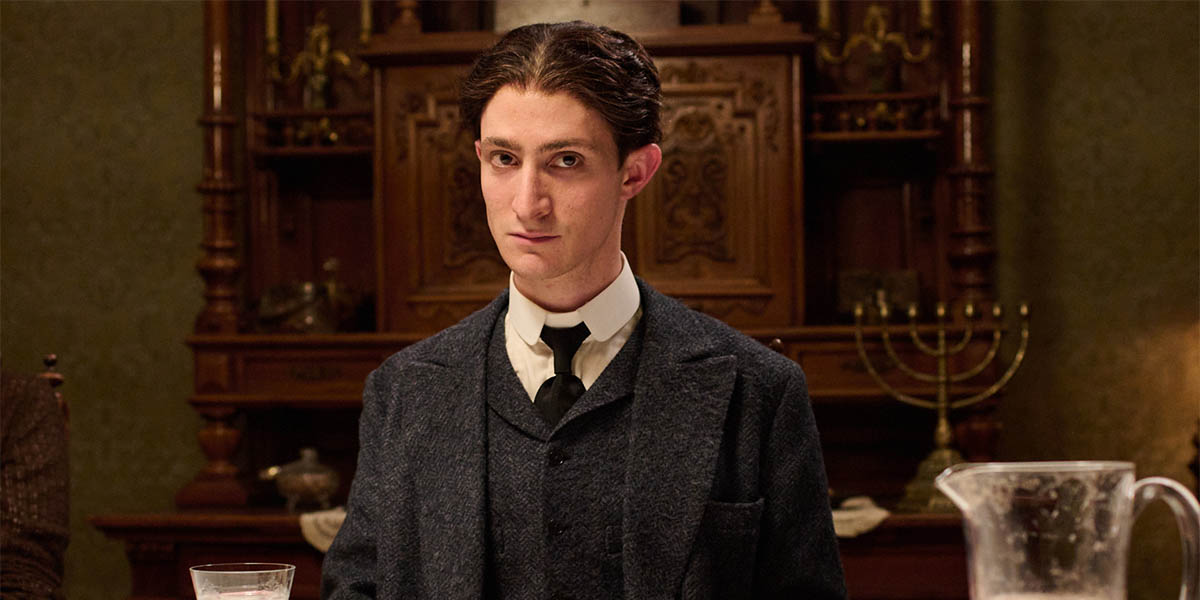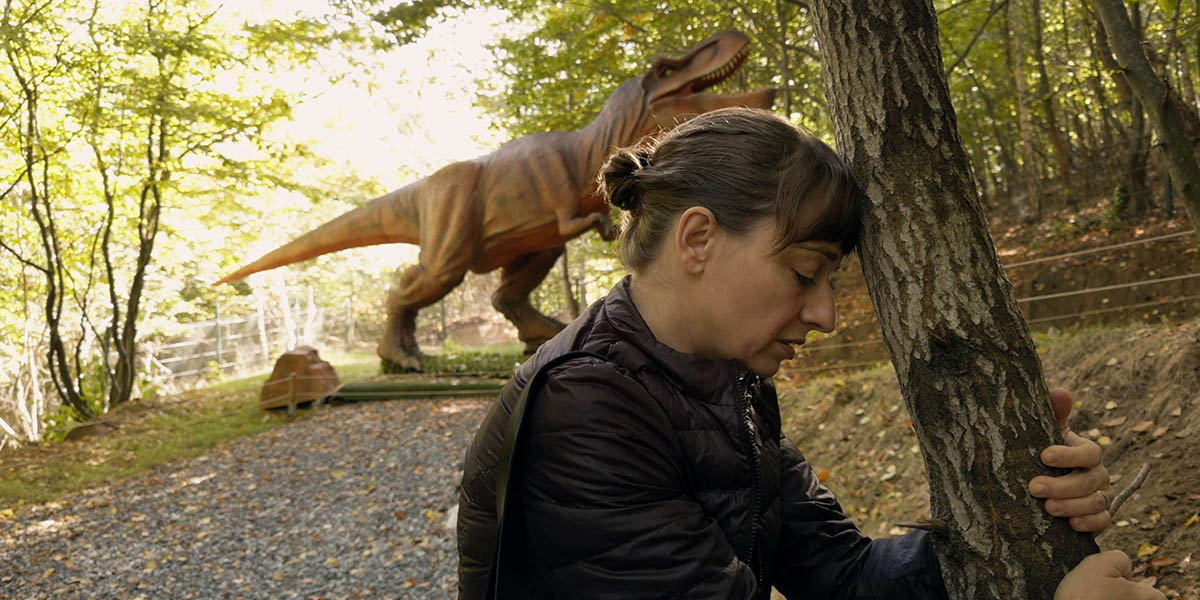Chicago International Film Festival is one of the few cinematic celebrations that takes the “international” in its name seriously. The festival has become known for inviting venerated foreign directors and the year’s hottest overseas titles from Venice, Cannes, Berlin, Locarno, and more. This year featured the return of some of their favorite voices: François Ozon, Agnieszka Holland, and Radu Jude—tackling literary figures and social fissures to varying degrees of success. And in a dispatch featuring three off-kilter films, it’s the somewhat conventional turn by a usually harebrained director that stands above the rest.
He strides through the frame with a stiff and heavy step; Benjamin Voisin as Meursault, the protagonist in François Ozon’s cinematic adaptation of Albert Camus’s “The Stranger,” matches the ambivalent tone of the classic character even when the movie doesn’t.
Without belaboring the plot—which is so ingrained in us that you’re basically born with it—Meursault is a quiet young man whose uneventful life is interrupted by the death of his mother. While Meursault performs the basic tasks of traveling to her retirement home and holding vigil, he doesn’t show any emotion. He instead remains expressionless. Nevertheless, he begins dating the beautiful Marie (Rebecca Marder), strikes up an ambivalent friendship with his abusive next door neighbor Raymond (Pierre Lottin), and, well, you know the rest.
In some respects, Ozon probably remains too faithful to the source material, lifting so much dialogue from the text the film’s language feels overworked. Still, he does make a couple of inspired choices. The film begins with a newsreel that introduces us to the story’s Algiers setting like plenty of gazey French eyes would’ve seen it at their local theater. He also attempts to give the Arab characters defined traits and makes pains to show the prejudice they’re forced to confront. Those choices, of course, partly diverge from Camus’s intent. Meursault’s disinterest in everyone around him, particularly the Arab people around him, is meant as a damning critique of the French’s way of not seeing these people of color. Ozon’s understandably modern impulse causes the film to be stuck between two aims: a loyalty to Camus and a desire to update the text for contemporary viewers—causing both to suffer.
Still, Ozon knows how to craft a composition. The rich black and white here embellishes his love of ethereal backlighting and his ability to carve mundane spaces into vacant wastelands. You can also see his influences too, which spans from “La Piscine” (which he remade in 2003 starring Charlotte Rampling) to “From Here to Eternity.” Voisin is also a dependable Meursault: He understands the emptiness of the character’s face and the searching in his eyes. He rarely overplays that aloofness but doesn’t seem to be hiding behind it either. With Ozon’s craftsmanship and Voisin’s approach pushed together, there’s just enough distance to allow this version of “The Stranger” to be worth visiting.

Even for a great filmmaker like Agnieszka Holland, the biopic is a challenging subgenre. “Franz,” her film about the famed Metamorphosis author Franz Kafka, is a massive statement whose many ideas slip into a common narrative structure. Holland, whose fascination with the writer is a life-long passion that includes adapting The Trial in 1981 for Polish TV, nearly takes a cradle to grave approach to follow Kafka from his early years to his untimely death, moving through his life in a kaleidoscopic fashion.
During the film we’re introduced to Kafka’s family, which includes his devoted sister (Katharina Stark) and his judgmental business-minded father (Peter Kurth), his partner Milena Jesenská (Jenovéfa Boková), and his literary champion Max Brod (Sebastian Schwarz). We learn that Kafka, like most writers, despised his day job in insurance, and wished he could leave it to focus on his craft. We also watch as he deteriorates from tuberculosis. Delivering this barrage of biographical facts makes Holland’s film less than conventional. It makes the picture feel factually basic. If one visited The Morgan Library & Museum’s exhibit on the writer earlier this year, they became familiar with much of the same information covered here.
Instead, “Franz” is far stronger in its visual choices. Prague during the 1920s was weird, and Holland recreates many of the Cubist inspired furniture, architecture, and fashion of the period. Holland also attempts to collapse time by moving the action toward a contemporary Kafka museum, walking tour, and even branded merch and food. All of the above are meant to show how this iconoclastic author is now merely a product, a multidimensional figure flattened by those who view him as a tragic genius and nothing more. The problem with “Franz,” unfortunately, is that Holland also struggles to present a version of him that isn’t that.
Nevertheless, there’s one scene that comes tantalizingly close to breaking the film wide open: It happens when those in the museum are watching the Kafka of the past, and the past Kafka can feel their glare. That anachronistic moment teases what the film could be: a biopic whose shaky reality and playful psychology fully matched the stature of the writer and his hold on our consciousness. Instead, what we’re left with is an ambitious picture that lacks a unique aim.

Though “Kontinental ‘25” is Radu Jude’s most “conventional” film—you can only use that word loosely when referring to his style—it is no less politically, historically and socially conscious. Its first ten minutes, in fact, chronicle the goings on of a houseless man (Gabriel Spahiu) as he traverses Cluj: panhandling, searching for work, and rummaging for recyclables. He lives in a basement, by a boiler—where gendarmes led by the bailiff Orsolya (Eszter Tompa) have arrived to evict him. He pleads for a few minutes to gather his stuff, allowing Orsolya and the gendarmes to leave for lunch and a smoke. When they return, they find him dead, hung to a radiator.
On its simplest level, “Kontinental ‘25” is about Orsolya’s ensuing guilt. In reality, it’s through her regret that Jude once again offers a cogent critique of both Romanian society and human apathy in the face of real suffering.
What’s immediately telling about Orsolya, for instance, is how often and to whom she tells how she found the houseless man’s body. She repeats the story at the office, to her husband, her mother, her best friend, and her former student law student, Fred (Adonis Tanța), whose propensity for regurgitating Zen axioms brings some lighthearted levity to Jude’s morbid humor. With each recounting, you come to wonder if there isn’t some self-serving desire on Orsolya. Does she want to be granted absolution or pity? Nevertheless, what’s also revealing are the many ways people react to her guilt: her boss brings up the houseless guy’s police record; her friend discusses why she both feels bad for the houseless and also wishes she didn’t see them; her priest condemns the man for being wicked. Each person finds some way to dehumanize him.
On top of Jude’s thematic decisions, he still retains his winking visual humor. At one point, Orsolya prays at an animatronic dinosaur theme park called Dino Parc Râșnov. At other points, he uses televisions playing commercials—his interest in advertising is the primary topic of his archival film “Eight Postcards from Utopia”—to frame Orsolya as she tells her stories. The juxtaposition, of course, draws a straight line from the cruel commercialism of modern existence as a primary reason for this man’s death. And while “Kontinental ‘25” is brimming with other ideas: the war in Ukraine, the genocide in Gaza, and anti-Hungarian sentiments in Romania—it’s the easy and smooth distillation of Jude’s wild antics pitched as political satire that makes “Kontinental ‘25” a sly statement by Jude that he can make “normal” movies too.
from Roger Ebert https://ift.tt/MEleGWB

.png)
.png)

